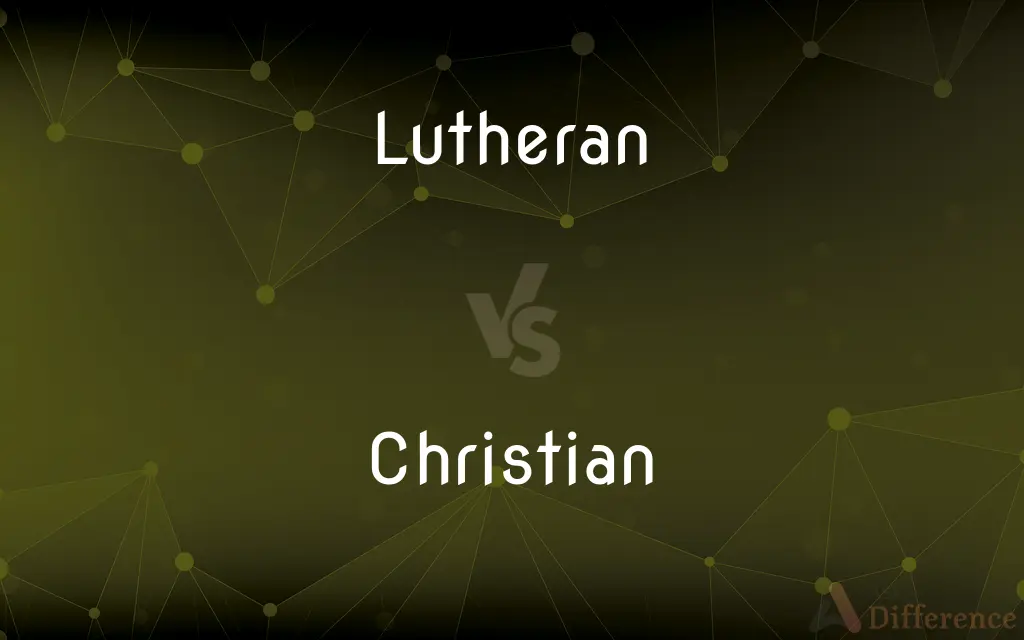Lutheran vs. Christian — What's the Difference?
By Tayyaba Rehman & Fiza Rafique — Updated on March 21, 2024
Lutheran refers specifically to followers of Lutheranism, a major branch within Christianity, emphasizing justification by faith. Christians encompass all who follow Christ, including various denominations.

Difference Between Lutheran and Christian
Table of Contents
ADVERTISEMENT
Key Differences
Lutheranism is a branch of Protestant Christianity which identifies with the theology of Martin Luther, a German reformer. Lutherans emphasize justification by faith alone and the authority of scripture. On the other hand, Christianity is a broader term that includes all those who believe in Jesus Christ and follow His teachings, encompassing a wide range of denominations including Lutherans, Catholics, Baptists, and many more.
Lutherans adhere strictly to the theological doctrines set forth by Martin Luther, such as the concept of Sola Scriptura, which holds that the Bible is the ultimate authority in matters of faith and practice. Whereas Christianity, as a whole, includes a diversity of interpretations and practices regarding the Bible and traditions, with some denominations placing a greater emphasis on church traditions and teachings.
One of the key elements of Lutheran worship is the emphasis on liturgy and sacraments, particularly Baptism and the Eucharist, as means of grace. In contrast, other Christian denominations might have different views on sacraments and worship styles, ranging from the highly ritualistic to the very simple and informal.
Lutheranism originated in the early 16th century as a result of the Reformation movement led by Martin Luther, making it a relatively newer branch within Christianity. Christianity, however, dates back to the 1st century AD, following the life, death, and resurrection of Jesus Christ, and has since evolved into a global religion with numerous denominations.
The Lutheran Church is known for its confessional writings, such as the Augsburg Confession and the Book of Concord, which outline its specific theological stance. This is while Christianity as a whole does not have a single unified set of doctrinal confessions, as doctrinal beliefs vary significantly among different Christian denominations.
ADVERTISEMENT
Comparison Chart
Definition
A branch of Protestantism following Martin Luther's teachings.
Followers of Jesus Christ, encompassing various denominations.
Authority
Sola Scriptura (Bible alone).
Bible, with variations in the role of tradition and church authority.
Sacraments
Baptism and Eucharist as primary sacraments.
Varies, from two sacraments to seven, or sometimes none.
Worship Style
Liturgical, with emphasis on hymns and liturgy.
Ranges from liturgical to non-liturgical.
Key Figures
Martin Luther
Jesus Christ, the apostles, church fathers
Compare with Definitions
Lutheran
In Lutheranism, Baptism and the Eucharist are considered means of grace.
Lutherans regularly partake in the Eucharist, seeing it as essential to their faith.
Christian
A monotheistic religion based on the life and teachings of Jesus Christ.
Christianity has grown to become the world's largest religion since its inception.
Lutheran
A Christian denomination that emphasizes justification by faith and the authority of scripture.
Lutheranism emerged from the Reformation, spearheaded by Martin Luther.
Christian
The holy scripture of Christians, consisting of the Old and New Testaments.
Christians read the Bible to understand God's word and Jesus' teachings.
Lutheran
A central Lutheran belief that faith alone, not deeds, grants salvation.
Lutherans hold that justification by faith is the core message of the Bible.
Christian
Christianity is divided into various denominations, each with distinct beliefs.
Major Christian denominations include Catholicism, Orthodoxy, and Protestantism.
Lutheran
The doctrine that the Bible is the sole authoritative source of religious truth.
In Lutheranism, Sola Scriptura underscores the importance of scripture over church traditions.
Christian
The central figure of Christianity, believed to be the Son of God.
Christians celebrate Christmas to mark the birth of Jesus Christ.
Lutheran
A foundational Lutheran document that outlines Lutheran beliefs.
The Augsburg Confession remains a key reference for Lutheran doctrine.
Christian
Christian worship practices vary widely among different denominations.
Christian worship can range from traditional liturgies to contemporary services.
Lutheran
Of or relating to the religious doctrines of Martin Luther, especially the doctrine of justification by faith alone.
Christian
Professing belief in Jesus as Christ or following the religion based on the life and teachings of Jesus.
Lutheran
Of or relating to the Protestant denomination adhering to these doctrines.
Christian
Relating to or derived from Jesus or Jesus's teachings.
Lutheran
A member of the Lutheran Church.
Christian
Manifesting the qualities or spirit of Jesus, especially in showing concern for others.
Lutheran
Of or pertaining to Luther; adhering to the doctrines of Luther or the Lutheran Church.
Christian
Relating to or characteristic of Christianity or its adherents.
Lutheran
One who accepts or adheres to the doctrines of Luther or the Lutheran Church.
Christian
One who professes belief in Jesus as Christ or follows a religion based on the life and teachings of Jesus.
Lutheran
Follower of Lutheranism
Christian
One who lives according to the teachings of Jesus.
Lutheran
Of or pertaining to Martin Luther or his teachings;
The Lutheran doctrine of justification by faith alone
Christian
Uncommon spelling of Christian
Lutheran
Of or pertaining to or characteristic of the branch of the Protestant Church adhering to the views of Luther;
Lutheran doctrines
Christian
Uncommon spelling of Christian
Christian
One who believes, or professes or is assumed to believe, in Jesus Christ, and the truth as taught by Him; especially, one whose inward and outward life is conformed to the doctrines of Christ.
The disciples were called Christians first in Antioch.
Christian
One born in a Christian country or of Christian parents, and who has not definitely becomes an adherent of an opposing system.
Christian
One of a Christian denomination which rejects human creeds as bases of fellowship, and sectarian names. They are congregational in church government, and baptize by immersion. They are also called Disciples of Christ, and Campbellites.
Christian
Pertaining to Christ or his religion; as, Christian people.
Christian
Pertaining to the church; ecclesiastical; as, a Christian court.
Christian
Characteristic of Christian people; civilized; kind; kindly; gentle; beneficent.
The graceful tact; the Christian art.
Christian
A religious person who believes Jesus is the Christ and who is a member of a Christian denomination
Christian
Relating to or characteristic of Christianity;
Christian rites
Christian
Following the teachings or manifesting the qualities or spirit of Jesus Christ
Common Curiosities
What is the main difference between Lutheran and Christian?
Lutheran is a branch within Christianity focusing on Martin Luther's teachings, while Christian refers to all followers of Jesus Christ.
What are the key beliefs of Lutheranism?
Lutheranism emphasizes justification by faith, the authority of the Bible, and the importance of sacraments like Baptism and the Eucharist.
Can someone be Lutheran and not Christian?
No, being Lutheran inherently means being Christian, as Lutheranism is a subset of Christianity.
Are Lutheran beliefs found in the Bible?
Lutherans believe their core teachings, like justification by faith and the authority of scripture, are biblically grounded.
How do Lutherans view the Bible compared to other Christians?
Lutherans adhere to Sola Scriptura, valuing the Bible as the ultimate authority, a view shared by many, but not all, Christian denominations.
What is the significance of the Augsburg Confession in Lutheranism?
The Augsburg Confession outlines key Lutheran doctrines, serving as a foundational document for the denomination.
How do the sacraments in Lutheranism compare to other Christian denominations?
Lutherans recognize two main sacraments (Baptism and the Eucharist) as means of grace, similar to some Christian denominations, while others may recognize more or fewer sacraments.
Do Lutherans consider themselves Christians?
Yes, Lutherans are Christians as they follow the teachings of Jesus Christ, aligning with the core principles of Christianity.
What distinguishes Lutheran worship from other Christian worship?
Lutheran worship is characterized by a structured liturgy, hymn singing, and a strong emphasis on the sacraments.
How do Lutherans interpret the role of good works in salvation?
Lutherans believe good works are a result of faith and not a means to achieve salvation, which is obtained through faith alone.
What is the historical origin of Lutheranism?
Lutheranism originated in the early 16th century during the Reformation, led by Martin Luther.
What role does tradition play in Lutheranism compared to other Christian traditions?
While tradition is valued in Lutheranism, it is considered secondary to the authority of the Bible, differing from some Christian traditions that place a higher emphasis on church teachings and traditions.
How does the concept of the priesthood of all believers fit into Lutheran beliefs?
Lutheranism upholds the priesthood of all believers, emphasizing that all baptized Christians have direct access to God and can minister in His name, a belief shared by many Protestant denominations.
Share Your Discovery

Previous Comparison
Boots vs. Shoes
Next Comparison
Happiness vs. PleasureAuthor Spotlight
Written by
Tayyaba RehmanTayyaba Rehman is a distinguished writer, currently serving as a primary contributor to askdifference.com. As a researcher in semantics and etymology, Tayyaba's passion for the complexity of languages and their distinctions has found a perfect home on the platform. Tayyaba delves into the intricacies of language, distinguishing between commonly confused words and phrases, thereby providing clarity for readers worldwide.
Co-written by
Fiza RafiqueFiza Rafique is a skilled content writer at AskDifference.com, where she meticulously refines and enhances written pieces. Drawing from her vast editorial expertise, Fiza ensures clarity, accuracy, and precision in every article. Passionate about language, she continually seeks to elevate the quality of content for readers worldwide.
















































